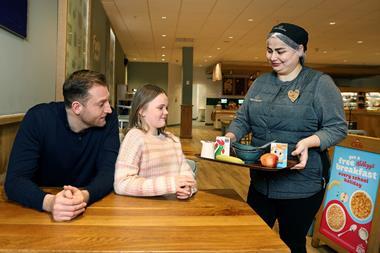In terms of brand recognition, The Holmes-Rahe Scale probably wouldn’t score very highly among the population at large. But in the world of stress management, it’s been a sacred text ever since a pair of American researchers, Thomas Holmes and Richard Rahe, first published it in the late 1960s.
Simply put, the scale ranks all the most significant events that people face in their lives according to how much stress they induce. Top of the list was the death of a partner, followed by divorce, marital separation, jail, death of a close relative, injury or illness and getting married. Work-related issues, such as redundancy and retirement, start creeping in shortly after that.
Useful though it can be - particularly in helping people to recognise that positive life events such as marriage or getting a new job can be stress-inducing - the Holmes-Rahe scale has been looking rather creaky in recent years. After all, a lot has changed since 1967 in the way we look at relationships, for example.
So it was interesting to see the results of a survey, Milestone or Millstone, published last month by consultancy PPC, which took a new look at these issues. PPC found its UK sample of 1,024 employees rated miscarriage as the most difficult life event to cope with, followed by the death of someone close and serious illness. Infertility was in fourth place, followed by splitting up with a serious partner and separation. Bringing up teenagers also made the top 10.
This reflects changing attitudes to what constitutes a major life event, and also changing patterns of behaviour. Miscarriage and infertility may be rising in importance because of people’s tendencies to start families later in life, for example.
This matters to employers because of the effect on productivity and absenteeism when employees go through major life changes, and because many employers just aren’t aware of the issues. For example, 62% of respondents admit to losing up to two hours a day of working time through absence, illness or lack of concentration when they are going through an experience like this, while nearly a quarter of employees say their productivity drops to less than half of their usual performance when they are under great stress. One in five said they’d felt suicidal when “in the grip”.
The good news is that most respondents - 61% - said their employers were generally supportive and sympathetic in these circumstances. However, there were marked differences in the experience of employees according to the sectors in which they work. For example, retailers suffered the worst drops in productivity of all the sectors in the survey; 32% of staff said their work rate dropped by half or more, compared with 25% in banking and 16% in the NHS.
Retail respondents tended to drink more and exercise less when they were going through major life changes, and had a greater tendency to contemplate killing themselves than staff in any sector other than education and training.
And in a classic case of physician, heal thyself, the survey found that human resources professionals appear to cope less well with life events than their colleagues in other functions - they are more likely, it seems to take anti-depressants, more likely to admit to making mistakes and more likely to experience a drop in productivity. Or perhaps they are just more aware of what’s happening to them?
As I’ve argued before in this column, all employers ought to be conducting regular stress audits and putting in place action places to try to reduce stress. It might be worth thinking, too, about the wider causes of stress in employees’ lives, and what support organisations can offer to staff.
n Steve Crabb is editor of People Management
Simply put, the scale ranks all the most significant events that people face in their lives according to how much stress they induce. Top of the list was the death of a partner, followed by divorce, marital separation, jail, death of a close relative, injury or illness and getting married. Work-related issues, such as redundancy and retirement, start creeping in shortly after that.
Useful though it can be - particularly in helping people to recognise that positive life events such as marriage or getting a new job can be stress-inducing - the Holmes-Rahe scale has been looking rather creaky in recent years. After all, a lot has changed since 1967 in the way we look at relationships, for example.
So it was interesting to see the results of a survey, Milestone or Millstone, published last month by consultancy PPC, which took a new look at these issues. PPC found its UK sample of 1,024 employees rated miscarriage as the most difficult life event to cope with, followed by the death of someone close and serious illness. Infertility was in fourth place, followed by splitting up with a serious partner and separation. Bringing up teenagers also made the top 10.
This reflects changing attitudes to what constitutes a major life event, and also changing patterns of behaviour. Miscarriage and infertility may be rising in importance because of people’s tendencies to start families later in life, for example.
This matters to employers because of the effect on productivity and absenteeism when employees go through major life changes, and because many employers just aren’t aware of the issues. For example, 62% of respondents admit to losing up to two hours a day of working time through absence, illness or lack of concentration when they are going through an experience like this, while nearly a quarter of employees say their productivity drops to less than half of their usual performance when they are under great stress. One in five said they’d felt suicidal when “in the grip”.
The good news is that most respondents - 61% - said their employers were generally supportive and sympathetic in these circumstances. However, there were marked differences in the experience of employees according to the sectors in which they work. For example, retailers suffered the worst drops in productivity of all the sectors in the survey; 32% of staff said their work rate dropped by half or more, compared with 25% in banking and 16% in the NHS.
Retail respondents tended to drink more and exercise less when they were going through major life changes, and had a greater tendency to contemplate killing themselves than staff in any sector other than education and training.
And in a classic case of physician, heal thyself, the survey found that human resources professionals appear to cope less well with life events than their colleagues in other functions - they are more likely, it seems to take anti-depressants, more likely to admit to making mistakes and more likely to experience a drop in productivity. Or perhaps they are just more aware of what’s happening to them?
As I’ve argued before in this column, all employers ought to be conducting regular stress audits and putting in place action places to try to reduce stress. It might be worth thinking, too, about the wider causes of stress in employees’ lives, and what support organisations can offer to staff.













No comments yet